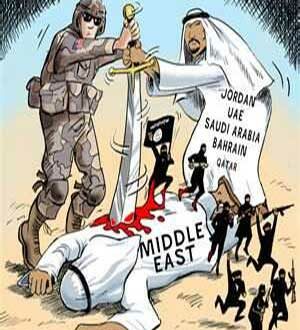Soon after it became clear that the US would not attack Syria as the Saudis had hoped and planned for, Bandar went to the Jordanian port city of Aqaba to meet director of Israel’s Mossad intelligence agency, Tamir Pardo. The aim was to coordinate Saudi-Israeli policy on Syria and Iran. This information was leaked by a source within the Saudi embassy in Amman, Jordan, indicating that within the Saudi ruling circles, there are strong differences.
It needs recalling that when the plot to stage the uprising in Syria was hatched in a Paris café in February 2011, Bandar attended it together with the US ambassador to Israel Dan Shapiro and US Undersecretary of State Jeffrey Feltman. Naturally a number of Syrian opposition figures were also involved. Both Shapiro and Feltman are Zionists and staunchly pro-Israel. The received wisdom at the time was that the Asad regime would collapse within a matter of months if not weeks.
Bandar has been making other moves as well, since the US refusal to attack Syria last August. He reportedly met with French President Francois Hollande when he visited Tel Aviv to meet Netanyahu. According to the Lebanese website, al-Hadath, Bandar proposed common policy on Iran’s nuclear policy to try and sabotage any deal with the US. Further, Bandar proposed the strengthening of Saudi defences (read, the Saudis would purchase more weapons, this time from France). This must have been music to Hollande’s ears since the French economy is struggling and any cash inflow would be welcome.
The Saudis’ open embrace of Zionists reflects their desperation. It should, however, alert all sincere Muslims to the true nature of this regime. The question that Muslims must ask is, whether the two holy cities of Makkah and Madinah can be left in the hands of Zionist allied Saudis. If Masjid al-Aqsa is under the direct occupation of the Zionists, Makkah and Madinah are under the indirect occupation of the Zionists since the Saudis are their close allies.
How long will Muslims tolerate this state of affairs to continue?
Aal Saud: From British to American lap
Always on the lookout for foreign protection, the illegitimate House of Saud rule in the Arabian Peninsula eagerly embraced Uncle Sam once he emerged as a global cop after the Second World War.
Abd al-‘Aziz ibn Saud had declared himself king once he occupied Makkah and Madinah under the excuse of the indifference of “foreign Muslims and later on the House of Saud switched from British to American tutelage.
Like his British paymasters, ‘Abd al-‘Aziz was playing a double role, as far as his local allies were concerned. His promises to the Ikhwan to establish a state where Islamic Shari‘ah would be supreme, ran contrary to his subservience to the British. He kept his Ikhwan allies in the dark about the money he was receiving from the British. Had they known about his British links, it is certain they would have branded him a kafir, and far from fighting for him, they would have rebelled against him. It can be said with certainty that had the Ikhwan known this, there would be no“Saudi Kingdom” today.
‘Abd al-‘Aziz now had to choose between the Ikhwan and the British. But he delayed the hour of reckoning as much as he could. In the meantime, he continued to enjoy the good life that kingship brought in its wake. With the Hijaz also under his control, he collected the pilgrims’ not inconsiderable revenues that flowed into his coffers every year. With these he began to acquire guns, as well as items of luxury, such as cars. At the end of 1926, he rode in a cavalcade to Riyadh where he declared himself the king of Najd as well. Now he had two kingdoms under his control — the Hijaz and Najd. He remained the king of two kingdoms until 1932 when he proclaimed the “Kingdom of Saudi Arabia.”
From 1926 onward, the Ikhwan’s dissatisfaction with ‘Abd al-‘Aziz grew. They went back to their settlements leaving Makkah, Madinah, Jeddah and Riyadh to him. But they were not left alone in their desert dwellings. British imperial ambitions were drawing arbitrary lines across the desert sand to establish borders for Transjordan, Iraq, Kuwait and the United Arab Emirates. British imperialism now came into conflict with the Arabians of the desert. This suited Ibn Saud fine. He too was anxious to subdue the Ikhwan. There was no more territory to conquer. As a British client, he understood his limits. He, therefore, had no more need for the Ikhwan and certainly had no intention of establishing a puritanical state based on the strict application of the Shari‘ah. That would have meant an end to the murky wheeling and dealing for which ‘Abd al-‘Aziz and his progeny have become notorious. The implementation of the harsher aspects of the Shari‘ah was kept strictly outside the walls of the palace to terrorize the population into submission. Inside, every vice was allowed, perhaps even encouraged.
A series of wars were fought against the Ikhwan throughout 1928 and 1929. Some of the well-known encounters occurred in 1929. The first took place at Sabillah near al-Artawiyah (March 1929) in which Faisal al-Daweesh of the Mutair and Sultan ibn Bijad of the ‘Utaybah were defeated. Al-Daweesh was wounded while Ibn Bijad was imprisoned. Ibn Saud also ordered the complete demolition of Ghot Ghot, the Ikhwan stronghold. In May 1929, Dhaidhan ibn Hithlain of the Ajman was tricked by Fahd, the son of‘Abdullah ibn Jaluwi, and while negotiating terms for peace, he (Dhaidhan) was murdered. This treachery threw all of Najd into rebellion against the Ibn Saud. The Ajman, ‘Utaybah and Mutair got together but Britain supported its client, Ibn Saud ,with guns, planes, vehicles and intelligence. In August 1929,‘Azaiyiz, Faisal al-Daweesh’s son, made a desperate bid to fight against Ibn Saud’s British-backed troops at Um Urdhumah. After bitter hand-to-hand fighting, ‘Azaiyiz and his men were defeated. He died of thirst in the desert and his skeleton was recovered many months later. This effectively broke the back of the Ikhwan revolt which continued for a little while longer. Their camels and swords were no match for the motorcades, guns and the cunning of the British. Britain had not only financed ‘Abd al-‘Aziz but backed him, first, against Hussain ibn Ali and, later, against the Ikhwan.
The British had come to stay in the Arabian Peninsula. Free from the influence of the Ikhwan, Ibn Saud now flung open his “kingdom” to foreigners. The British, as usual, were there ahead of everyone else. Harry St. John Philby, father of Kim Philby who gained notoriety when he defected to Moscow in the early-1960s, was an eccentric Englishman. He claimed to have embraced Islam and became an “advisor” to the now old and limping ‘Abd al-‘Aziz ibn Saud. (He was not really that old but nearly blind in one eye and in poor health). Philby began to direct Saudi policy on all matters.
He came none too soon, for the great depression had descended upon the world. With it the pilgrim traffic declined, decimating ‘Abd al-‘Aziz ibn Saud’s revenues. He was in desperate need of cash. Relief came by way of the Americans through one Charles R. Crane. Crane, a plumber from Chicago, had made a fortune out of providing relief for his fellow countrymen by selling them sanitary wares. Crane had already gained from experience of the Muslim East when President Woodrow Wilson had sent him in 1919, together with Dr. Henry King — thus the King-Crane Commission — to ascertain the wishes of the people of Palestine toward the partition scheme which would create a Zionist State there. In 1931, Crane came back looking for Arabian horses but ended up signing an agreement to prospect for oil in the vast emptiness of the Arabian desert. Oil, the black gold, had already been discovered in Iran in 1908, and in Bahrain the Standard Oil Company of California — Socal — struck it in 1932. After a preliminary survey through Crane’s agent, Philby, now also working as an agent for Socal, brokered an agreement giving the American company a sixty-year concession in Hasa, eastern Arabia. The Americans agreed to pay ‘Abd al-‘Aziz in gold sovereigns. Socal, later to be transformed into the Arabian American Oil Company (Aramco), first struck oil in March 1938. More oil was discovered in mid-1938 and Arabia under Ibn Saud was already on its way to new fortunes when the Second World War broke out.
The Americans could no longer afford to risk their tankers on the long journey to the Persian Gulf bringing oil. Thus, Ibn Saud’s fortunes began to decline again. But along came the British to his rescue, once again. In 1940, even while Britain was tightening its belt at home, it sent food and supplies to ‘Abd al-‘Aziz to pacify the hungry — and angry — people and to keep their protégé in power until after the war.
The war years were lean times for all, especially ‘Abd al-‘Aziz ibn Saud who was dependent upon revenues from pilgrims, the sale of dates, hand-outs from the British and revenues from oil. The war had affected everything. The pilgrims’ numbers declined to 32,000 in 1940. The dates, already affected by drought in Najd, were not sold in such large quantities since there were fewer pilgrims to buy them. The British could ill-afford to pay large sums to him during the war just as the Americans did not want to risk their tankers.
But ‘Abd al-‘Aziz must consider himself extremely fortunate. In 1943, the Americans suddenly discovered that as a gas station for the allied war effort, they were pumping out 63% of the world’s oil consumption daily. At this rate, they were depleting their reserves at the rate of 3% annually. This was a frightening realization for a country beginning to have visions of becoming a superpower. The US Interior Secretary, Harold L. Ickes, came up with an ingenious plan to “save American oil: burn foreign oil.” A US memorandum of December 1942 had already recorded “that the development of Saudi Arabian petroleum resources should be viewed in the light of the broad national interests.” Armed with such “vital interests” to protect, the Americans arrived with the Lend-Lease agreement which was signed in February 1943. Some $33 million poured into ‘Abd al-‘Aziz’s coffers in two years after the signing of the agreement over and above oil revenues. While the Americans were robbing Arabia with both hands, cash-strapped ‘Abd al-‘Aziz thought he had struck gold. Like a feudal lord, he distributed the revenues from oil among his sons, relatives and sycophants, as if it was his private fortune. This practice continues to this day.

 Mouood Mouood English Edition
Mouood Mouood English Edition



